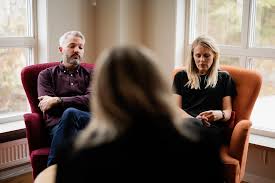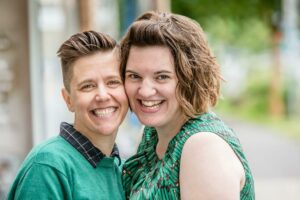If you are in a lesbian, gay, bisexual, transgender, or queer relationship, you may be considering couples therapy. This type of therapy can be extremely beneficial for LGBTQ couples. It can help to improve communication and resolve conflicts. In this blog post, we will discuss the benefits of LGBTQ couples therapy and how it can help your relationship!
Contents
What Is LGBTQ Couples Therapy?
 LGBTQ couples therapy is a form of psychotherapy that specializes in helping LGBT (lesbian, gay, bisexual, transgender, and queer) couples increase understanding between partners. Through this type of counseling, therapists use various techniques to help LGBTQ couples develop healthy communication skills and explore ways to strengthen their relationships.
LGBTQ couples therapy is a form of psychotherapy that specializes in helping LGBT (lesbian, gay, bisexual, transgender, and queer) couples increase understanding between partners. Through this type of counseling, therapists use various techniques to help LGBTQ couples develop healthy communication skills and explore ways to strengthen their relationships.
Common topics addressed in LGBTQ couples therapy include:
- Relationship roles and responsibilities
- Gender identity and expression
- Family dynamics
- Sexual orientation
- Sex and intimacy
- Conflict resolution
- Self-care strategies
LGBTQ couples therapy can be an invaluable resource for those who are looking to create a more meaningful and fulfilling relationship. Through this type of therapy, couples can learn to better understand each other’s needs and make their relationship stronger.
What Therapies Are Used For LGBTQ Couples?
If you’re in an LGBTQ relationship, you may want to consider LGBTQ couples therapy. Here are a few techniques used by therapists to help LGBTQ couples:
Emotionally Focused Therapy (EFT)
EFT is a couples therapy approach that focuses on identifying and changing negative emotional patterns that can lead to conflict and distance in a relationship. EFT can be particularly helpful for LGBTQ couples who may face unique stressors related to their identity.
Gottman Method Couples Therapy
This approach is based on the research of Drs. John and Julie Gottman, and focuses on building skills in communication, conflict resolution, and emotional connection. The Gottman Method can be adapted to the unique needs of LGBTQ couples.
Cognitive Behavioral Therapy (CBT)
CBT is a type of therapy that helps individuals identify and change negative thought patterns and behaviors. In couples therapy, CBT can be used to address specific issues, such as jealousy or communication problems, that may be impacting the relationship.
Narrative Therapy
This approach emphasizes the importance of storytelling and encourages individuals to create new, positive narratives about themselves and their relationships. For LGBTQ couples who may have experienced discrimination or marginalization, narrative therapy can be a powerful tool for building resilience and a positive sense of identity.
Integrative Behavioral Couple Therapy (IBCT)
 This approach combines elements of traditional behavioral therapy with acceptance-based strategies. IBCT can be particularly helpful for LGBTQ couples who are struggling with issues related to acceptance, such as coming out or dealing with family rejection.
This approach combines elements of traditional behavioral therapy with acceptance-based strategies. IBCT can be particularly helpful for LGBTQ couples who are struggling with issues related to acceptance, such as coming out or dealing with family rejection.
It’s worth noting that there is no one “right” therapy technique for LGBTQ couples – the best approach will depend on the unique needs and challenges of each individual couple. A skilled therapist will be able to assess the situation and recommend the most effective treatment plan.
What Usually Happens In Couples Therapy?
LGBTQ couples therapy is similar to other forms of couples therapy in many ways. But it also has some unique aspects due to the specific challenges and issues that LGBTQ couples may face. Here are some things that may typically happen in LGBTQ couples therapy:
- Assessment
The therapist will typically start by conducting an initial assessment to gather information about the couple’s history, relationship, and specific concerns. This may involve asking questions about their individual and shared experiences related to their sexual orientation, gender identity, and any other relevant factors.
- Goal-setting
Based on the assessment, the therapist and the couple will work together to identify specific goals for therapy. These may include improving communication, addressing conflicts related to identity or family of origin, or learning strategies for coping with external stressors like discrimination or societal pressure.
- Skill-building
Depending on the couple’s needs, the therapist may focus on teaching specific skills, such as communication techniques or conflict resolution strategies. These skills can be adapted to the unique needs and experiences of LGBTQ couples.
- Exploration of identity
LGBTQ couples may face unique challenges related to their sexual orientation, gender identity, or other aspects of their identity. A skilled therapist can help couples explore these issues in a safe and supportive environment, and work through any related conflicts or challenges.
- Reconnecting
Depending on the nature of the couple’s concerns, the therapist may also work on helping the couple reconnect emotionally and sexually. This may involve addressing any underlying issues that are impacting their intimacy and working on building a stronger emotional connection.
Overall, LGBTQ couples therapy is designed to help couples build a stronger, more resilient relationship in the face of the unique challenges they may face. The specific techniques and strategies used will depend on the individual needs of the couple. But the goal is always to support them in achieving their desired outcomes.
What Benefits To Expect With LGBTQ Couples Therapy?
 The following are some of the benefits that can be expected from LGBTQ couples therapy:
The following are some of the benefits that can be expected from LGBTQ couples therapy:
1. Improved communication and understanding – Couples therapy is designed to help partners better understand each other’s needs and opinions. This understanding helps couples more effectively communicate with one another, which leads to stronger relationships.
2. Deeper connection – In couples therapy, LGBTQ couples are encouraged to explore their relationship on a deeper level. This exploration can help partners gain a better understanding of each other and create a stronger bond between them.
3. Validation – This therapy provides a safe space for partners to discuss their feelings and experiences without judgment. This helps both people in the relationship feel heard and understood, which is essential for creating a healthy relationship.
4. Conflict resolution – Couples therapy can help partners learn how to effectively manage conflict in their relationship. This includes teaching them tools for effective communication, understanding each other’s perspectives, and developing strategies for resolving disagreements.
5. Improved self-awareness – LGBTQ couples therapy helps partners gain a better understanding of their own emotions and needs. This self-awareness can help them make decisions that are in the best interest of the relationship, as well as give them the tools to effectively express themselves.
So, you can see the many potential benefits of LGBTQ couples therapy. Not only can it help strengthen relationships. But it can also provide a safe and supportive environment for partners to work on their issues together. If you’re in an LGBTQ relationship, consider exploring the possibility of couples therapy as a way to improve your relationship.
When Is LGBTQ Couples Therapy Not Appropriate?
Usually, this is an effective way, but here are some situations where LGBTQ couples therapy may not be appropriate:
- When one or both partners have unresolved emotional trauma. It’s important for both individuals to take the time to work through any unresolved issues before beginning couples counseling.
- If your relationship is suffering from physical, mental, or substance abuse. Couples may need additional help to address these issues before they can move forward in couples therapy.
- When one or both partners are not willing to commit to the process. Both partners must be able to be open and honest about their feelings and needs for couples counseling to be effective.
- If one of the partners is still struggling with coming out or facing gender identity issues. It’s important for both people to be comfortable with their identity before beginning couples therapy.
- When there is a lack of communication or trust between the partners. Couples need to be able to openly talk about issues and trust each other for LGBTQ couples therapy to be successful.
No matter what, it’s important to take the time to make sure that LGBTQ couples therapy is right for you and your partner. It’s also important to find a therapist who understands the unique needs of LGBTQ couples and can provide a supportive, nonjudgmental environment.
How To Find LGBTQ Couples Therapy Near Me?
 It might seem daunting to think about finding LGBTQ couples therapy near you, but it doesn’t have to be. Here are some tips on how to find an LGBTQ-friendly therapist and the right fit for your needs:
It might seem daunting to think about finding LGBTQ couples therapy near you, but it doesn’t have to be. Here are some tips on how to find an LGBTQ-friendly therapist and the right fit for your needs:
- Ask around: Reach out to friends and family in the LGBTQ community who might be able to provide referrals or recommendations.
- Research online: There are dedicated websites and directories that provide lists of therapists who specialize in LGBTQ-related issues. You can also use the search function on therapeutic organizations’ websites to narrow down your results.
- Check credentials: When researching a potential therapist, be sure to check their credentials and experience with LGBTQ-related issues. Ask whether they have any additional training or certification in this area.
- Schedule an initial consultation: Once you’ve identified a few potential therapists, schedule an initial consultation to get a better feel for their style. And whether or not they are the right fit for your needs.
- Ask questions: During the initial consultation, ask any questions you may have about their qualifications, approach to therapy, and the specific services they provide.
- Trust your gut: Once you’ve chosen a therapist, trust your gut. If you don’t feel comfortable talking to them or if something just doesn’t seem right during the initial session, it’s okay to move on and try another therapist.
Finding the right LGBTQ couples therapy near you doesn’t have to be a difficult process. With a bit of research, patience, and an open mind, you can find a qualified therapist who is well-suited to your needs.
Conclusion
In conclusion, LGBTQ couples therapy is being provided by more and more organizations to help individuals in the LGBTQ community. And work through their issues, both personal and communal. The goal is to create an accepting environment that allows for healthy conversations about issues within the queer community. Do not hesitate to seek out therapy or counseling services if you are part of the LGBTQ community. As it can be a beneficial experience that leads to growth and understanding.
For more information, please contact MantraCare. The LGBTQ community encompasses individuals who identify as lesbian, gay, bisexual, transgender, and queer. If you have any queries regarding Online LGBTQ Counseling experienced therapists at MantraCare can help: Book a trial LGBTQ therapy session


